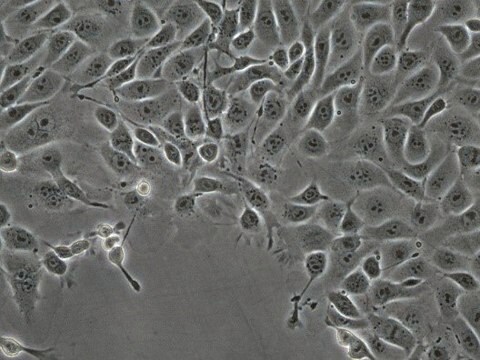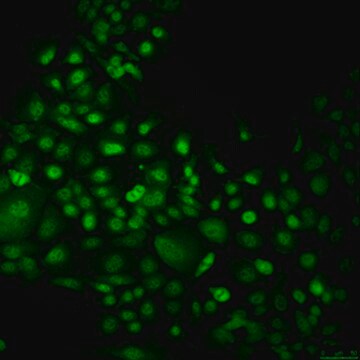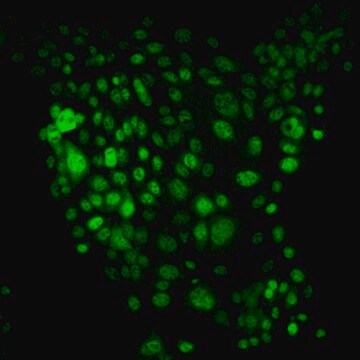Allgemeine Beschreibung
SCC627, the luciferase-expressing derivative of SCC626, retains the capability for invasive growth, as well as the expression of many of the hallmark genes of OPSCC. These include cytokeratin, E-cadherin, BRCA2, p16, and EGFR. SCC627 was successfully used to optically track metastasis through the lymphatic space to the lungs, which is anatomically relevant to human oropharyngeal cancers. Along with SCC625 and SCC626, this series of cell lines comprise a suitable platform for mechanistic studies of OPSCC and for testing therapeutic intervention strategies.
Anwendung
mEERL cells are verified to be of mouse origin and negative for human, rat, Chinese hamster, Golden Syrian hamster, and non-human primate interspecies contamination, as assessed by a Contamination Clear panel by Charles River Animal Diagnostic ServicesCells tested negative for infectious diseases against a Mouse Essential CLEAR panel by Charles River Animal Diagnostic Services.Cells tested negative for mycoplasma.
Zielbeschreibung
The head and neck cancers represent the sixth most common class of cancer. Among them, incidents of oropharyngeal squamous cell carcinoma (OPSCC) are on the rise, and a majority of them are caused by the human papilloma virus (HPV). Although successful management methods exist, local recurrence and nodal metastasis continue to result in mortality in certain cases. Historically, insights into HPV-induced transformation have been obtained in the context of the cervical cancer and anogenital warts models. While much of it is relevant to OPSCC, it will be beneficial to have the systems in which the effects of HPV infection can be studied in a context specific to OPSCC.The parental strain for SCC627, the mouse E6/E7/hRas/luciferase (mEERL) cell line, was established by the retroviral transduction of the HPV E6 gene, the HPV E7 gene, and the human hRas G12V gene into the primary mouse oropharyngeal epithelial cells. Due to the synergistic effects of the three oncogenes, the resulting cell line (also available as SCC626, the mEER cell line) was shown to be capable of cultivation, anchorage-independent growth in vitro, and the formation of poorly-differentiated, aggressively metastatic tumors following orthotopic injection into immune-competent mice.SOURCESCC627 is a luciferase-expressing derivative of the mEER cell line (SCC626). SCC626 was established by the retroviral transduction of the HPV16 E6 gene, HPV16 E7 gene, and the human hRas gene into the primary oropharyngeal epithelial cells isolated from a male C57BL/6 mouse. oropharyngeal. REFERENCES1.Kademani D. 2007. Oral cancer. Mayo Clin Proc. 82(7): 878-87. 2.Rogers SN, Brown JS, Woolgar JA, Lowe D, Magennis P, Shaw RJ, Sutton D, Errington D, Vaughan D. 2009. Survival following primary surgery for oral cancer. Oral Oncol. 45(3):201-11. 3.Pytynia KB, Dahlstrom KR, Sturgis EM. 2014. Epidemiology of HPV-associated oropharyngeal cancer. Oral Oncol. 50(5): 380-6. 4.Hoover AC, Spanos WC, Harris GF, Anderson ME, Klingelhutz AJ, Lee JH. 2007. The role of human papillomavirus 16 E6 in anchorage-independent and invasive growth of mouse tonsil epithelium. Arch Otolaryngol Head Neck Surg. 133(5): 495-502. 5.Williams R, Lee DW, Elzey BD, Anderson ME, Hostager BS, Lee JH. 2009. Preclinical models of HPV+ and HPV- HNSCC in mice: an immune clearance of HPV+ HNSCC. Head Neck. 31(7): 911-8. 6.Vermeer DW, Coppock JD, Zeng E, Lee KM, Spanos WC, Onken MD, Uppaluri R, Lee JH, Vermeer PD. 2016. Metastatic model of HPV+ oropharyngeal squamous cell carcinoma demonstrates heterogeneity in tumor metastasis. Oncotarget. 7(17): 24194-207.
Sonstige Hinweise
This product is intended for sale and sold solely to academic institutions for internal academic research use per the terms of the “Academic Use Agreement” as detailed in the product documentation. For information regarding any other use, please contact licensing@milliporesigma.com.
Haftungsausschluss
Unless otherwise stated in our catalog or other company documentation accompanying the product(s), our products are intended for research use only and are not to be used for any other purpose, which includes but is not limited to, unauthorized commercial uses, in vitro diagnostic uses, ex vivo or in vivo therapeutic uses or any type of consumption or application to humans or animals.







